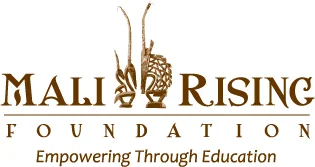By Adama Kone, Teacher Project Manager
We are in the second year of trying out a new tactic to help our students – assessing their French language skills so their teachers can better help them learn. The assessments are critical because poor French skills make it nearly impossible for students to learn their other subjects and they get discouraged and drop out. This year, we are doing the assessments in four partner villages, and we spoke with one participating student -- Awa Doumbia, a 7th grade student at Judge Memorial Middle School after her assessment.
Awa works on the reading comprehension section of the new French Assessment.
Awa is about 13 years old and she likes school. She says she likes school because not only does she get to hang out with her classmates in schoolyard during their breaks, but she also has a big dream for her future. That dream? She wants to be a lawyer. She chose to become a lawyer in the future because she wants to be rich, have nice cars, build beautiful houses for her family and help the people from her village
Awa told me she is grateful to Mali Rising Foundation for building a nice middle school in her own village, which saves her from walking several miles daily to school. Awa does not think she would have been able to continue school without the construction of Judge Memorial Middle School.
Although Awa has a big dream of becoming a lawyer, she confesses that many of her classmates need to improve their French skills. Awa told me they have been struggling to get good scores. Awa likes to study French, especially essay writing, which is her favorite task! However, Awa thinks math is too hard and she fears she will never be very good at it. .
Awa Doumbia was thrilled to participate in the French Assessment Project in her school. She was also happy many of her classmates came and participated in it. Awa told me, “The assessment was not too hard and I believe I will not get very bad scores.” One of the reasons why she was happy to take part in the assessment was that because she assumes after the assessment her teachers will be able to help her better with areas she has been weak in.
The assessments measure students’ skills in vocabulary, reading comprehension, understanding spoken French, and speaking French. French is the national language of instruction, so if our students do not have basic French skills by the 7th grade they are at a real disadvantage when it comes to learning algebra, history, or any other subject. Teachers can use the results of the assessments to target help to a student’s specific needs and to design a plan for remediation where needed.
To wrap up my talk with Awa, I teased her by asking if she tried to cheat during the assessment. She was at least honest answering! She admitted that she tried once to write the same thing as her neighbor, but she was not able to because of teacher was watching over the whole classroom.
Results from Awa’s assessment and her classmates’ assessments will be shared with her teachers. We will then work with the teachers to create a plan to intervene to help the students improve their language skills over the course of the school year. At the end of the year, the students will take a second assessment to see if their scores have improved. Stay tuned to hear how Awa and her friends improve this year!


